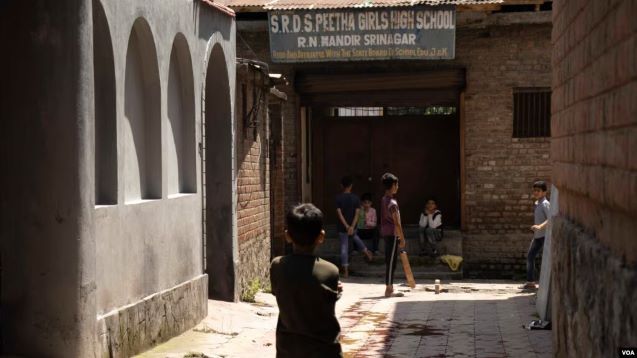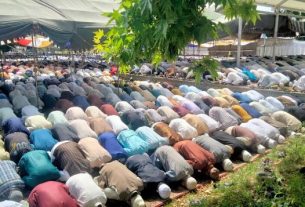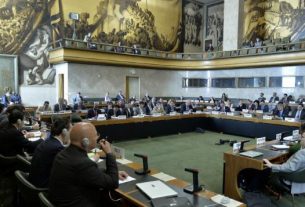A once-powerful symbol of harmonious relations between Muslims and Hindus in Indian-administered Kashmir today sits vacant and decaying on a quiet Srinigar side street, providing little more than a backdrop for youngsters practicing their cricket skills and dreaming of a better future.
Founded in 1951 by Hindu Pandit Parmanand Bhat in a Muslim-dominated area, the school known as Rupa Devi Sharda Peeth “stood as a beacon of hope and empowerment for the girl students from underprivileged backgrounds in the region,” recalled Vimla Dhar, a retired professor and the granddaughter of the founder.
At its height, placements in the school were avidly sought by Hindu and Muslim parents, who entrusted almost 700 students to its care at any time. Its attractions included some of Kashmir’s finest scholars among the teaching staff, and a treasured library of rare Sanskrit manuscripts and books — alongside a vast collection of literature in various languages.
Decline set in during the early 1990s when rising Muslim militancy prompted a mass migration of Hindus — almost all members of the Pandit community — from the Kashmir Valley, sharply reducing the number of Hindu students. And on May 8, 1922, a devastating fire destroyed the building along with its magnificent library.
The school carried on in temporary quarters for a few years and then in a newly constructed one-story building under the direction of Bhat’s descendants, but it never regained its former glory. Financial problems finally forced the family to shut it down in 2020, with only a hope of one day reopening.
Bhat established the institute as a tribute to his daughter, Rupa Devi, who suffered an untimely death in 1947. He retired from his position as the account general of the then-undivided princely state of Jammu and Kashmir and donated his pension to finance the school that would bear her name.
The rest of the school’s name comes from Sanskrit, where “Sharda” means “goddess of learning” and “Peeth” means “seat of learning.”
The institution’s original purpose was to educate girls, with a focus on Sanskrit, modern education and vocational skills. However, after initial challenges, the school transitioned towards general schooling and, under Vimla Dhar’s direction, revolutionized the region’s educational landscape by introducing co-education for girls and boys.
Aijaz Ahmed Shalla, a 40-year-old alumnus of the school and successful entrepreneur, reminisced about the impact the institution had on his life. Walking past the now-vacant school building with a VOA reporter, he described his time there as a cherished and irreplaceable part of his childhood.
“It was a place that nurtured and shaped the futures of many brilliant doctors and engineers, instilling within them a passion for knowledge and a drive for excellence,” he said.
Vividly, Shalla recalled the heart-wrenching day when the school was engulfed in flames, leaving the staff and students standing helplessly at a distance. As young children, they could only watch as the seat of their learning and growth turned to ashes.
While the cause of the 1992 fire has never been officially determined, it has long been associated with the militancy of the time.
“As schools were targeted and set ablaze, so was the school run by the Rupa Devi Sharda Peeth Trust,” wrote author Khemlata Wakhlu in her book, “A Kashmiri Century: Portrait of a Society in Flux.”
“With the burning of the school, some of the world’s rarest books and manuscripts — in Pali, Sanskrit, Persian, Hindi, Urdu and English — all went up in smoke! The greatest treasure of Kashmir — the ideas and words of wise and erudite seekers over the ages — which had all been kept intact in the premises of school, were gone. There was nothing left. Everything was burned to ashes.”
Plans to rebuild were dashed when the regional government withdrew the promise of a plot of land, saying the land had already been committed to another purpose.
“After the devastating fire, we faced enormous challenges and we have put in lots of efforts to rebuild Sharda Peeth,” said Dhar, the founder’s granddaughter. “The school was temporarily relocated to an empty building belonging to a migrant Pandit in the aftermath of the incident.”
Dhar and her family kept the school running for most of the next three decades until financial difficulties finally forced them to shut the doors three years ago.
“Despite our best efforts, it became increasingly burdensome to maintain the school’s activities. Eventually, we made the tough decision to cease school operations a couple of years ago temporarily to prevent further strain on already limited finances,” Dhar said.
The loss of the school is keenly felt by local residents like Nazir Ahmed Shora, now in his 60s.
“After the blaze, there was no proper school building, no funds, no playground facility, nothing but students and yet, it survived,” he told VOA. “Now, not a single person in this locality is happy to see the school locked. It’s a terrifying void to experience. We want children back to this abandoned school, to replace silence with jubilant buzz once more.”
Dhar remains uncertain how or if the family will ever be able to re-open the school, but for many neighborhood children, it remains a beacon of hope for a pathway to a better future.
“We practice our cricket skills here, so when the day comes that the school reawakens, we’ll be ready to make friends and have amazing matches together,” enthused Adil Bhat, a 7-year-old local boy who plays with his friends in front of the empty building most evenings.__Courtesy VOA





